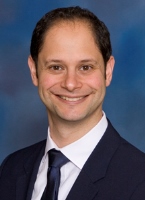
A Wayne State University School of Medicine women's reproductive health research scholar and his mentor won accolades at the Society of Reproductive Investigation annual meeting for using a minimally invasive method to isolate placental cells from the cervix of a pregnant female. The research may allow for an alternative, non-invasive method to diagnose genetic abnormalities in fetuses before they are born, at as early as five weeks gestation.
Assistant Professor of Obstetrics and Gynecology Rani Fritz, D.O., received the Pfizer President's Presenter Award for his oral presentation of "Single Neucleotide Polymorphism Analysis of Trophoblast Cells Isolated from the Endocervical Canal of Ongoing Pregnancies" at the society's March meeting in Florence, Italy.
The award also honored his mentor and lab director, D. Randall Armant, Ph.D., a professor of Obstetrics and Gynecology and of Anatomy and Cell Biology.
"He is the brainchild behind this unique technique of isolating placental cells from the cervix of ongoing pregnancies," Dr. Fritz said.
Other team members include lab technician Brian Kilburn and reproductive endocrinology and infertility fellow Jay Bolnick, M.D., who was involved in key portions of this research and research before the study.
"After we isolate these placental cells we amplified the DNA. We then compared the DNA of the placental cells we obtained from the cervix with the maternal DNA and found differences indicating that these placental cells we obtained are truly from the fetus," Dr. Fritz said. "We were also able to identify the Y chromosome in these placental cells from pregnancies with male fetuses. These findings lay the foundation for an alternative minimally invasive earlier method for prenatal genetic diagnosis compared to what is available now."
The Pfizer President's Presenter Award was established in 1996 to recognize the 25 most meritorious abstracts submitted by individuals still in training to encourage young investigators to pursue a research career. Fellows and researchers in both pre- and post-doctoral training are eligible.
"When we found out that we won it was rewarding to know that our hard work in the laboratory was acknowledged," Dr. Fritz said. "We likely won the award because of the significance that our research may have in the field of obstetrics and gynecology."
The team will now work to ensure the genetic makeup of the isolated placental cells mimic those in the fetus.